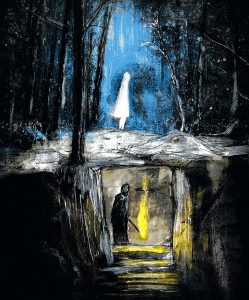An essay by Thomas Allen, as provided by Paul Crenshaw
Art by Luke Spooner
On the whole of a long January evening, with the snow howling outside the windows and the wind whistling up under the eaves, I had taken it upon myself to build a great fire in the hearth of my study and work my way through a leather-bound volume of obscure 15th century manuscripts on alchemy and a decanter of 17th century brandy, figuring one would complement the other, as the fire would complement the wind and the snow. The night was especially fierce, as thunder accompanied the snow, a strange and rare occurrence, and the strength of the storm caused the house–my ancestral home, very sturdy despite its advanced age–to shake and shudder. It seemed I could feel the cold creeping in, even with the fire roaring and the brandy going down smoothly. Every few moments I put the manuscripts down, set the brandy snifter atop them, and rose from my reading chair to stand at the window and look out. Despite the storm, the night was bright, as the snow that had gathered seemed luminescent, though I could not see far even then because of the snow blowing in the wind. Even when lightning struck and lit up the night I could see nothing, though the world turned bright as day, but it was during one such strike–a long strike that seemed to color the world for three or four seconds, or maybe it was a series of strikes coming so rapidly one upon the other that they seemed fused into one–that I thought I saw a figure in the storm, struggling toward the house. I had drunk four or five glasses of brandy by then, and was in no way fully sober, though I had not yet reached the point in the night–as I had been doing since the loss of Isil a year before–to where my faculties were compromised.
She wore white, I was sure, just as sure as I was that the figure was a she. Her hair seemed as white as the snow, and her skin like a princess in some child’s fable, a story told to teach the young about the cruel harshnesses of life. I knew enough of those. Isil had taken to her bed in the winter, and lay dead by spring. No amount of caring for her would save her, for I tried. I hired the best doctors, sent for learned men from among my colleagues and acquaintances, but still she perished, all my erudite learning in the alchemic arts to no avail. I was there when the life left her, like a small sigh escaping into the air from between her silenced lips, and something of my soul escaped from my body as well, a part of me that wished to no longer live.
I stood at the window for a long time after seeing the apparition, for that is what I assumed it to be, peering into the darkness, flinching each time the lightning struck, but I did not see her again. I went down the long hall to the front door and opened it and stood there with the snow blowing in and the storm howling down on me, squinting into the darkness and calling out, but no sign of woman or ghost appeared. When I got back to my reading room, I drank off the brandy in the glass, then filled it and did it once again until my hands stopped shaking and my heart returned to a more normal rate. The world swam drunkenly around me, but still I could not rid myself of the vision, for it seemed to spawn a wild thought that I could not suppress, not even after yet another brandy.
The thought crept into my head that it was Isil, that I had mistakenly buried her alive. I had heard of such cases. Most accidental, though in my field, dark rumors circulated about potions that would seemingly cause death for a few days, but once the period had passed, the person would rise as if from a long sleep, no harmful effects on the body at all, and standing there at the window, the thought came to me that this had somehow happened to Isil–she had gotten into my potions, perhaps trying to relieve herself of a headache, and taken something that rendered her seemingly dead. In my grief and worry over her, I simply had not inspected her thoroughly enough to detect the faint heartbeat, hear the shallow breath. She was still alive!
To read the rest of this story, check out the Mad Scientist Journal: Spring 2019 collection.
On any winter’s night, Thomas Allen can be found drinking brandy and reading obscure manuscripts on alchemy, philosophy, religion, and reincarnation.
Paul Crenshaw’s essay collection This One Will Hurt You is forthcoming from The Ohio State University Press. Other work has appeared in Best American Essays, Best American Nonrequired Reading, The Pushcart Prize, anthologies by W.W. Norton and Houghton Mifflin, Interzone, Oxford American, Glimmer Train, North American Review, and Brevity, among others.
Luke Spooner, a.k.a. ‘Carrion House,’ currently lives and works in the South of England. Having recently graduated from the University of Portsmouth with a first class degree, he is now a full time illustrator for just about any project that piques his interest. Despite regular forays into children’s books and fairy tales, his true love lies in anything macabre, melancholy, or dark in nature and essence. He believes that the job of putting someone else’s words into a visual form, to accompany and support their text, is a massive responsibility, as well as being something he truly treasures. You can visit his web site at www.carrionhouse.com.
“On a Winter’s Night” is © 2019 Paul Crenshaw
Art accompanying story is © 2019 Luke Spooner

